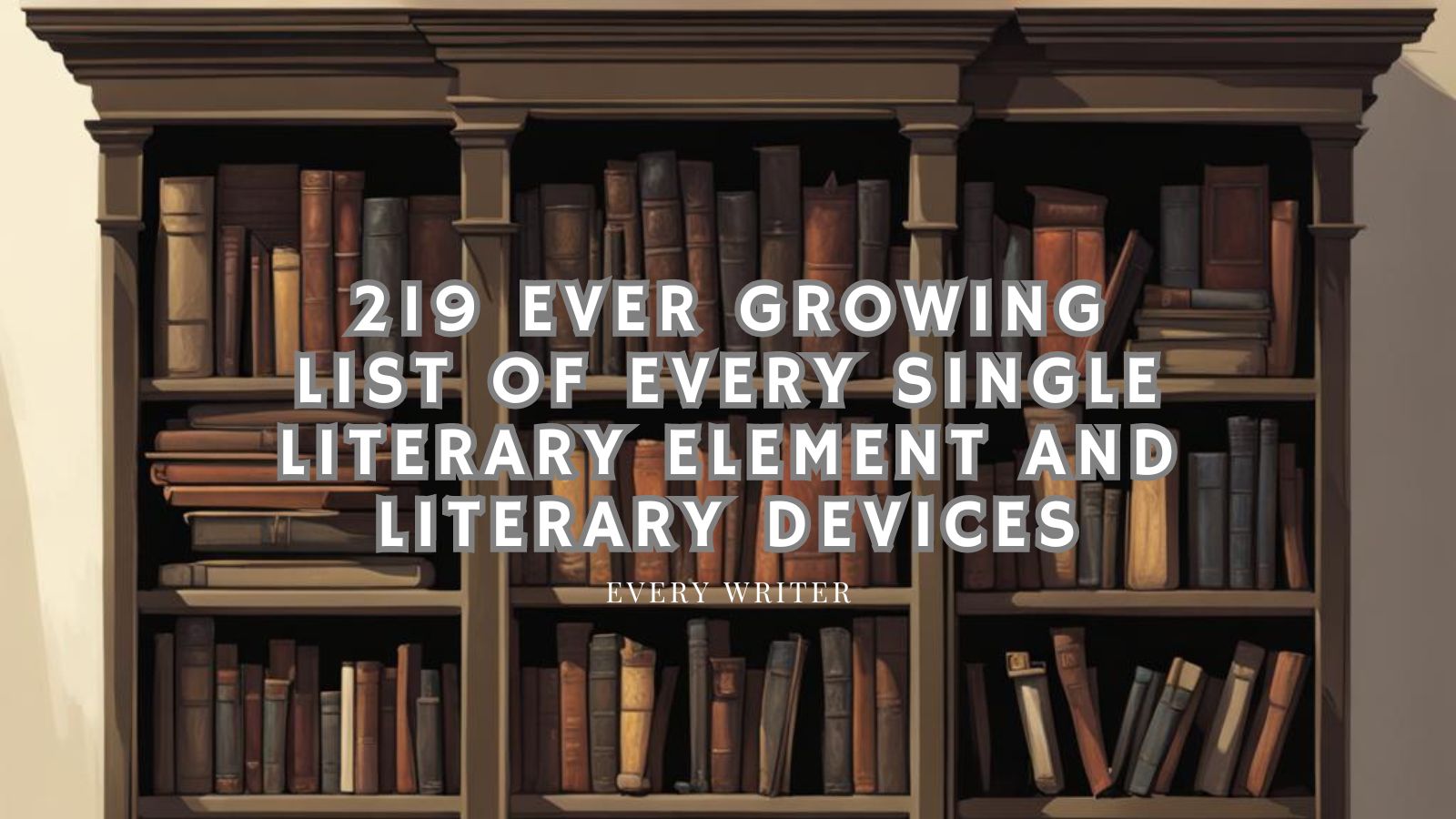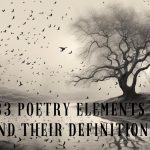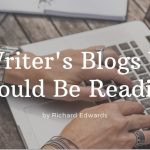219 Every Growing List of Every Single Literary Element and Literary Devices
So we are collecting a list of literary elements. This list is cobbled together from a bunch of different sources and by a few different people. We did our best to not repeat and to get everything accurate, but I know we make mistakes sometimes. If you see one, please leave it in the comments.
We want this to be the list of every single literary element know to humans, but I am sure we left some out. If you know of one we are missing, please! add to our list. If you leave the term in the comments WE WILL ADD IT.
Otherwise, if you are just looking for some lit terms you haven’t heard of before, there may be a few down below. Please take a look, and I hope you find this list inspirational.
- Accent – Distinct pronunciation associated with a particular region or social group
- Alliteration -Repetition of initial consonant sounds
- Allusion – A brief reference to something external
- allusion – Brief reference to a person, event, work, or concept with significance outside the text
- anacoluthon – Abrupt change of syntax within a sentence, or shifting grammatical construction
- Anadiplosis – Repetition of the last word of a preceding clause
- Anagnorisis – A critical moment of insight or realization
- Analepsis – Flashback interrupting the chronological sequence
- analogy – Comparing two different things to highlight similarities between them
- Anapest – Two unstressed syllables followed by a stressed syllable
- Anaphora – Repetition of a word or phrase at the start of clauses
- Anastrophe – Inversion of usual word order (e.g. Yoda’s speech)
- Anecdote – A short account of an interesting event or incident
- Antagonist – A character who opposes the protagonist
- Antihero – A protagonist lacking conventional heroic traits
- Antistrophe – Repetition of words in reverse order
- Apologue – A moral fable or allegorical story with pointed meaning
- aporia – Expression of real or feigned doubt about what to think, say, or do next
- Aposiopesis – Breaking off speech abruptly as if unable or unwilling to continue
- Apostrophe – Addressing an absent person or abstract entity
- Appositive – Placing adjacent nouns referencing the same thing
- Archetype – A symbolic character, situation, or object
- Aside – When a character speaks directly to the audience
- Assonance – Repeating internal vowel sounds
- asyndeton – Omission of conjunctions between clauses, often to speed up the pace
- atmosphere – The mood or emotional shade of a work
- Bildungsroman – A coming-of-age novel
- Blank verse – Unrhymed iambic pentameter
- Cacophony – Harsh, discordant sounds
- Cadence – The rhythmic flow of language
- Caesura – A pause within a line of poetry
- Catachresis – Inappropriate metaphor using words in the wrong context
- Catharsis – Release of emotional tension through art
- Character – A person or animal in a story
- characterization – Methods an author uses to portray and develop characters
- Chekhov’s gun – Narrative detail with later significance foreshadowed by attention drawn to it
- Chiasmus – Reversal of grammatical order in two phrases or clauses
- Cliché – An overused expression or theme
- Cliffhanger – An abrupt ending leaving the outcome uncertain
- Climax – The peak moment of conflict
- Comedy – A humorous story with a happy ending
- Comic relief – Humor used to lighten an otherwise serious work
- complexity – Portraying characters with nuance, depth, contradiction, and ambiguity
- Conceit – An elaborate metaphor making unlikely comparisons
- Confidant(e) – Character functioning as a close friend or advisor who a protagonist confides in
- Conflict – A struggle between opposing forces
- Connotation – Emotional/social associations of a word
- Cosmic irony – Individual’s helplessness before the enormity of universe’s chaos
- Couplet – Two consecutive rhyming lines
- Dactyl – One stressed syllable followed by two unstressed syllables
- Deception – Misleading readers or characters about reality
- Defamiliarization – Language making the familiar seem unfamiliar
- Denotation – Literal definition of a word
- Denouement – The final resolution after the climax
- Deus ex machina – An unexpected power resolving a situation
- Diacope – Repetition broken up by intervening words
- Dialect – Characters speaking in a regional variety of language
- Dialogue – Conversation between two or more characters
- Diction – Word choice
- Digression – Temporary departure from the main subject in speaking or writing
- direct characterization – Directly telling readers about a character
- Discourse – Communication of meaning through language interchange
- Dramatic irony – Discrepancy between what characters know and what audience knows
- Dramatic monologue – A speech by one character revealing their thoughts
- Dynamic character – A character who changes over time
- End rhyme – Rhyme occurring at the ends of lines
- Enjambment – Continuing a sentence over multiple lines
- Epanalepsis – Repetition at the end of a clause the word that occurred at the beginning
- Epilogue – A concluding section that rounds off or continues a work
- Epistolary – Told through documents like letters and diary entries
- Epistrophe – Repetition of a word or phrase at the end of clauses
- epithet – An adjective or descriptive phrase expressing a quality or attribute
- Ethos – Appeal to ethics or credibility
- Euphemism – A mild or indirect word substituted for a harsher one
- Euphony – Pleasant, harmonious sounds
- Exposition – Background information presented to readers
- Extended metaphor – A metaphor expanded throughout a work
- External conflict – A character struggles against an outside force
- Eye rhyme – Words with similar orthography but different pronunciation
- Falling action – Events after the climax
- Farce – Absurd, highly exaggerated comedy with exaggerated characters
- Feminine rhyme – Rhyme on two final syllables (motion/ocean)
- Figurative language – Language using figures of speech
- Figure of speech – A word or phrase used in a non-literal way
- Flashback – Interrupting the story to show events that happened earlier
- Flashforward – A scene depicting expected future events
- Flat character – A simplistic character lacking depth
- Foil – Character who contrasts with another character
- Foreshadowing – Hints or clues about future events
- Frame story – A story within a story
- Free verse – Poetry without a regular meter or rhyme scheme
- Full rhyme – Rhyme in which root vowels and final consonants match
- Gothic fiction – Supernatural, gloomy, medieval-inspired setting; omens, mystery
- Haiku – A 3-line poem with 5/7/5 syllables
- Hendiadys – Two nouns linked by conjunction to express single complex idea
- Hubris – Excessive pride or arrogance
- hubris – Excessive pride that leads to the protagonist’s downfall
- Humor – Anything that elicits amusement or laughter
- Hyperbaton – Disturbing usual word order to create emphasis
- Hyperbole – Exaggeration for emphasis or effect
- Iamb – An unstressed syllable followed by a stressed syllable
- imagery – Language evoking sensory details to build vivid impressions
- In medias res – Beginning a story in the middle of the action
- inclusio – Repetition of words at the beginning and end of a text to create a framing effect
- indirect characterization – Showing a character through actions, dialogue, appearance
- Interior monologue – Inner thoughts of a fictional character conveyed as directly represented
- Internal conflict – A character struggles with inner thoughts and feelings
- Internal rhyme – Rhyme occurring within a line
- Interpolation – Insertion of extraneous material interrupting continuity of work
- intertextuality – Reference to other literary works, authors, or pop culture
- Irony – Discrepancy between expected results and actual results
- Juxtaposition – Contrasting two things side-by-side
- Leitwortstil – Purposeful repetition of wording usually associated with a theme
- Line – A row of words in a poem or song lyrics
- Litotes – Affirming a statement by denying its opposite
- Logos – Appeal to logic
- Lyric – A short poem expressing a speaker’s thoughts and feelings
- MacGuffin – Object of pursuit that drives plot although its specific nature is unimportant
- Magical realism – Realistic fiction with supernatural or dreamlike elements
- malapropism – The mistaken use of an incorrect word in place of one that sounds similar
- Masculine rhyme – Rhyme on final syllable (stall/wall)
- Metafiction – Fiction that draws attention to its fictional nature
- Metalepsis – Referencing metatextual levels or temporal frameworks
- Metaphor – Comparing two unlike things by saying one is the other
- Meter – The rhythmic structure of verse
- Metonymy – Substituting a related term for an actual thing
- Minimalism – Extremely sparse, stripped-down prose style
- Mixed metaphor – Combining incompatible metaphors illogically
- Monologue – A long speech by one character
- Mood – Atmosphere or pervading emotion evoked
- Motif – Recurring images, ideas, or symbols
- non sequitur – An illogical or absurd statement whose meaning does not follow logically from what preceded it
- Objective – Narrator only describes actions and dialogue, no inner states
- Objective correlative – A symbol representing a character’s emotions
- Objective point of view – Narrator relates only externally viewable elements
- Ode – A long poem praising or glorifying someone or something
- Onomatopoeia – Words that imitate sounds
- Overstatement – Exaggerating something beyond what is reasonable
- Oxymoron – Two contrasting words placed together
- Pacing – The speed at which a story progresses
- Paradox – A statement that seems self-contradictory but reveals a truth
- Parallelism – Similarity of structure in a pair or series of related words, phrases, or clauses
- Parataxis – Sentences lacking conjunctions between independent clauses
- Parody – Imitation of style or content meant to ridicule or make comedic point
- Pastiche – Imitation of style blending multiple qualities in a new work
- Pathetic fallacy – Giving human emotions to nature
- Pathos – Appeal to emotion
- Peripeteia – A sudden reversal of circumstances
- Periphrasis – Use of excessive verbiage or roundabout speech
- Persona – Assumed role or fictional identity adopted by an author or character
- Personification – Giving human traits to the nonhuman
- Perspective – The narrator’s viewpoint and outlook
- Picaresque – Relating the episodic adventures of a rogue or antihero
- Plot – Events that form the story
- Poetic justice – Virtue rewarded and evil punished
- point of view – The narrative perspective from which the story is told
- polysyndeton – Deliberate use of many conjunctions not needed for sense
- polysyndeton – Use of many conjunctions between clauses, often to slow down the pace
- Preface – An introduction explaining the background of a work
- Prolepsis – Flashforward hinting at future plot developments
- Prologue – An introductory section that sets the stage
- Prose – Ordinary language writing without meter or rhyme
- protagonist – The central character or chief agent of change in a work
- Pun – A play on words with the same sound but different meaning
- Purple prose – Writing overly extravagant, ornate, or flowery
- Pyrrhic – Two unstressed syllables together
- Quatrain – A four-line stanza or poem
- register – Level of formality in language used
- Register – Level of formality of language employed
- Resolution – The conclusion when loose ends are tied up
- rhetoric – Effective use of language for persuasion or style
- Rhetorical device – A technique used to convey meaning
- rhetorical question – Question intended to provoke thought rather than elicit answer
- Rhyme – Correspondence of terminal sounds in two or more words
- Rhyme scheme – The pattern of rhyme at the ends of lines
- Rising action – Events building up to the climax
- Romance – Imaginative fiction dealing with chivalry, adventure, idealized characters
- Round character – A complex character with depth
- Sarcasm – Bitter or cutting ironic remarks intended to mock
- Satire – Humor used to mock, scorn, criticize through irony, sarcasm, ridicule
- Second person – Narrator refers to the reader as “you”
- sensory detail – Sight, sound, smell, touch, taste descriptions to evoke imagery
- Setting – When and where the story takes place
- Simile – Comparing two unlike things using “like” or “as”
- Situational irony – Outcome failing to fulfill expectations built up in a narrative
- Slant rhyme – Incomplete rhyme with similar but not identical sounds
- Soliloquy – A speech expressing a character’s private thoughts
- Sonnet – A 14-line poem with a fixed rhyme scheme
- Spondee – Two stressed syllables together
- Stanzas – Grouping of lines or verses in poetry
- static character – Character who does not change over the course of a work
- Stream of consciousness – Narrative reproducing the random flow of thoughts in conscious mind
- Style – Literary techniques giving a work distinctive qualities
- Subjective point of view – Narrator relates characters’ internal thoughts/feelings
- Suspension of disbelief – Accepting unrealistic elements in a story
- Syllepsis – A word yoked to two others although appropriate to only one
- Symbolism – Using objects or images to represent abstract concepts
- Synecdoche – Part representing the whole or vice versa
- Synecdoche – Using a part to represent the whole
- Syntax – Arrangement of words into meaningful grammatical order
- Tercet – A stanza of three lines
- Theme – The main idea or underlying meaning
- Third person limited – Narrator knows thoughts/feelings of one character
- Third person omniscient – Narrator knows thoughts/feelings of all characters
- Tone – Narrator’s attitude toward subject matter as perceived by reader
- Tragedy – Drama with unhappy ending brought about by protagonist’s flaws
- tragic flaw – The weakness or imperfection that leads to a hero’s downfall
- Tragicomedy – A story with both tragic and comedic elements
- Trochee – A stressed syllable followed by an unstressed syllable
- Trope – Artistic use of figurative language
- Understatement – Intentionally minimizing a statement’s importance
- Unities – Rules governing unity of time, place, and action
- Unreliable narrator – Narrator whose credibility is undermined or questionable
- Verbal irony – Use of words conveying the opposite of their literal meaning
- Verse – Writing arranged with a rhythmic structure
- Voice – Perspective conveyed through speech, writing, and actions
- Volta – A turning point in a poem
- Wit – Cleverly apt, ingeniously associate disparate ideas
- Zeugma – Using one word to govern two others although appropriate to only one
We hope you have enjoyed this list. If you see any mistakes, put them in the comments. If you think of any we forgot, please put those in the comments.
- 100 Screenwriting Ideas to Get You Writing - January 20, 2026
- 100 Winter Storm Writing Prompts - January 17, 2026
- 100 Haunted House Story Starters: Craft Your Scariest Tale Yet - January 10, 2026




